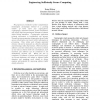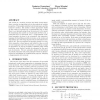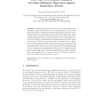216 search results - page 23 / 44 » Formal Proofs for the Security of Signcryption |
ACSAC
2006
IEEE
14 years 1 months ago
2006
IEEE
We propose an architecture of four complimentary technologies increasingly relevant to a growing number of home users and organizations: cryptography, separation kernels, formal v...
CCS
2001
ACM
14 years 11 hour ago
2001
ACM
The events of a security protocol and their causal dependency can play an important role in the analysis of security properties. This insight underlies both strand spaces and the ...
SP
1998
IEEE
13 years 11 months ago
1998
IEEE
A strand is a sequence of events; it represents either the execution of legitimate party in a security protocol or else a sequence of actions by a penetrator. A strand space is a ...
EUROCRYPT
2007
Springer
14 years 1 months ago
2007
Springer
Abstract. Multiparty signature protocols need protection against roguekey attacks, made possible whenever an adversary can choose its public key(s) arbitrarily. For many schemes, p...
SP
2008
IEEE
13 years 7 months ago
2008
IEEE
This paper presents FABLE, a core formalism for a programming language in which programmers may specify security policies and reason that these policies are properly enforced. In ...



